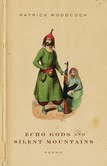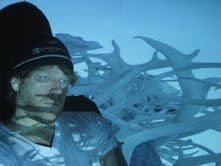
By Ava Homa:
Rather than standing at a distance and putting Kurds under a Western microscope, Woodcock becomes a Kurd when he writes, as if he has lost loved ones in genocides too, as if his hometown, school and hospital have been smashed too, as if he has unearthed the ground and has tried to identified the long-“disappeared” family and relatives too. “For as long as our city sits/on oil/we will sit in blood,” (p. 21).
Deciding on the genre of poetry, rather than non-fiction, while writing about a nation the rest of the world is repellently ignorant about, is a rare and brave decision of a writer who does not exchange his art with sales and book buzzes, and does not wish to discourage the reader from visiting Kurdistan. In a conversation with CBC, Woodcock explains his decision on the genre that, “Poetry allows you to explore the broad canvas of the page and manipulate space, language and rhythm. It lets you capture a moment that would be lost of lesser eyes while letting its beauty come forth in a way that non-fiction is incapable of.”
Woodcock is not “only curious;” beyond and regardless of language, cultural, and gender chasm, Woodcock empathizes with the Kurds. That’s why when, in his poetry, Mariama says, “They want to ride you like a mule, have you carry the weight of their cowardice. Nareen, we are only seen through our organs …” (23), we believe the voice. “Time is male. Time broke me. I wanted to sue my parents in the graveyard. They taught me love, forgiveness, purity. How does that help in corrupt times?” (25-6). Woodcock does not jump between the reader and the character. We hear Mariama.
Woodcock pinpoints and portrays humanity, purity and sacrifice, in the midst of debris, chaos and corruption. While he is aware that, “The rapists are now hotel owners and company Presidents. Hair that was once shaved off is now dyed,” (27) Patrick zooms on Mama Najat who, in his teahouse, shelters and tends to “those labelled ‘crazy,’” but Najat “barely has enough money to care for his twelve children.” Mama Najat bathes these men, pays for their medication, and is worried that they get teased and hurt. “People call them crazy, but they are not. Saddam’s fucking regime made them like this. Some of these men were educated and had families,” (44) Woodcock, or rather Mama Najat, says. “I have one man who gets very angry when his food is late./He throws things. Once he even hurt me, but I cannot blame him./Sometimes Hadi sits and yodels, or sings words from old songs …I cry …/I like it when he sings. He has a lovely voice,” (45). Mama Najat points out that foreigners come by, take photos but leave and forget. He receives no support.
Woodcock is not the Westerner whose country manufactured the weapons that Saddam used to bomb the Kurds over and over again. “In the construction of your communities,” Woodcock writes, “think of us/ your roads are not ours/ your parks and cars as well/But we are yours,” (40). “They have stolen from us, without veils or blindfold,” Woodcock has no qualm to condemn the thieves.
Patrick Woodcock, borrows the voice of the Kurds, does not distance himself, does not judge, does not analyze. “When my brother was born, I recorded his date. June 14th is not July 1st.” His poetry is powerful, beautiful, complicated, deep, and inundated with Kurdish references.
Echo Gods and Silent Mountains, in this reader’s opinion, is the best book ever written on Kurds: unique in both form and content. The book is a proof of Woodcock’s exceptional ability to commiserate with a nation invisible to the rest of the world; he becomes a Kurd, feels the plight, and carries the weight of a century of massacre, of endless pain. Woodcock is a genuine voice.
Coming across writers like Patrick Woodcock who writes for the love of it, regardless of what sells, is heartening. I have come across writers who publish on Kurds without having read enough about the Kurds or have lived in Kurdistan for more than a week. Woodcock spent two years in the heat and dust of Kurdistan, mingled with the Kurds and listened to their stories without trying to make decisions for them.
“Among history’s elaborate/labyrinths of hate/ can purity/perdure/copulate?” Patrick Woodcock.
Copyright © 2012 Kurdistantribune.com
.jpg)




Hello,
Thank you for the wonderful article/review of my book. But the name of it is ‘Echo Gods and Silent Mountains’ not ‘Echo Gods and Other Mountains’ –
Kindest Regards
Patrick Woodcock
Apologies Patrick. Now corrected. New link is: http://kurdistantribune.com/2012/echo-gods-silent-mountains-by-patrick-woodcock-review/
Patrick,
You are such an amazing man. I have tremendous respect for you. The adventures you seek, the risks you take and the words you speak. All in the name of humanity and belief in a greater good.
The world is a better place with you in it.
Monica
When you were in FGH, wouldn’t mind if I got my book signed. Little late
Thank you both Ava Homa and Patrick Woodcock,
for writing on my nation, the kurds, the greatest minority without a state of their own, I searched amazon, and will definitely order a copy, Thank you Ava for your wonderful review
Pshtiwan